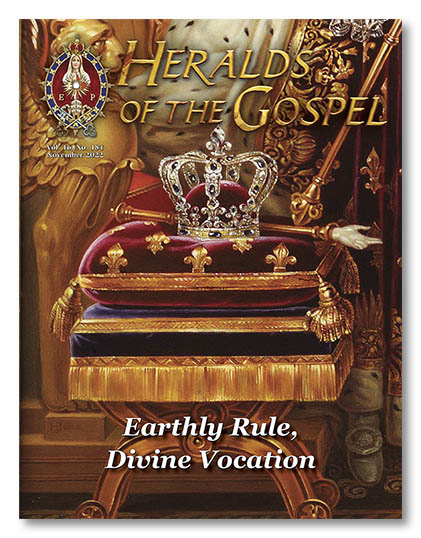St. Thomas Aquinas teaches that “to govern is to lead in a suitable way to the proper end” (De regno ad regem Cypri. L.I, c.15). All communities – families, cities and nations – have their own idiosyncrasies and, therefore, their own means of achieving the common good. All, however, must be directed to the one transcendent ultimate good, that is, to God.
Moreover, the distinction between the spheres of Church and State must be preserved: “Render therefore to Caesar the things that are Caesar’s, and to God the things that are God’s” (Mt 22:21). These words of Our Lord do not point to an anti-religious secularism, and even less to a religion hostile to the State. Indeed, as St. Pius X emphasizes in the Apostolic Letter Notre Charge Apostolique, “society will not be built unless the Church lays the foundations for it and directs its work.” Christian Civilization was conceived precisely in order to “restore all things in Christ.”
Nevertheless, not every style of government is compatible with the Catholic Faith; some, in fact, may be antagonistic. St. Augustine distinguished the city of God from the city of the devil, as well as the faithful people from the unfaithful; those who live by faith from those in opposition to it.
We find this incompatibility in each of the three main revolutions – Protestant, French and Communist: St. Thomas More, for example, did not sell his soul and preferred death to accepting the corruption of Henry VIII of England; the Carmelite martyrs of Compiègne proudly ascended the scaffold singing to the Holy Spirit who governs all things; finally, countless innocents were murdered by Bolshevism, a “political religion” which intended to replace the Church.
Such scourges were not isolated to Europe. In Mexico, the Calles Law of 1926 imposed the greatest anti-Catholic persecution ever known to the Americas. Cries of “Long live Christ the King!” preceded the deafening discharge of firing squads that claimed the lives of thousands of the Cristero martyrs. They were convinced that it was better to die for the King of kings than to kneel before a tyrant.
Today, in the 21st century, an age when men boast of having achieved liberty, equality and fraternity, verifiable data show that one out of every seven Christians in the world suffers persecution. And unfortunately this trend is not on the wane…
Nevertheless, there is no reason for discouragement. If, at La Salette, the Queen of Heaven and earth foresaw a crisis in the very bosom of the Church and, at Fatima, prophesied that Russia would spread her errors throughout the world, many nations would be annihilated and the good would be martyred, She also declared: “In the end, my Immaculate Heart will triumph.”
In fact, as Dr. Plinio Corrêa de Oliveira affirmed, anywhere in the world where there is a priest, and a host and wine to consecrate, everything can be restored. The driving force of the Counter-Revolution is not found in politics, in conspiracies or demagogy, nor in a Church submissive to the dictates of the world, but rather in the strength of the faithful soul, in the heroes – in short, in the Saints. They alone triumph, because even dying they continue to live; they are immortal. ◊



